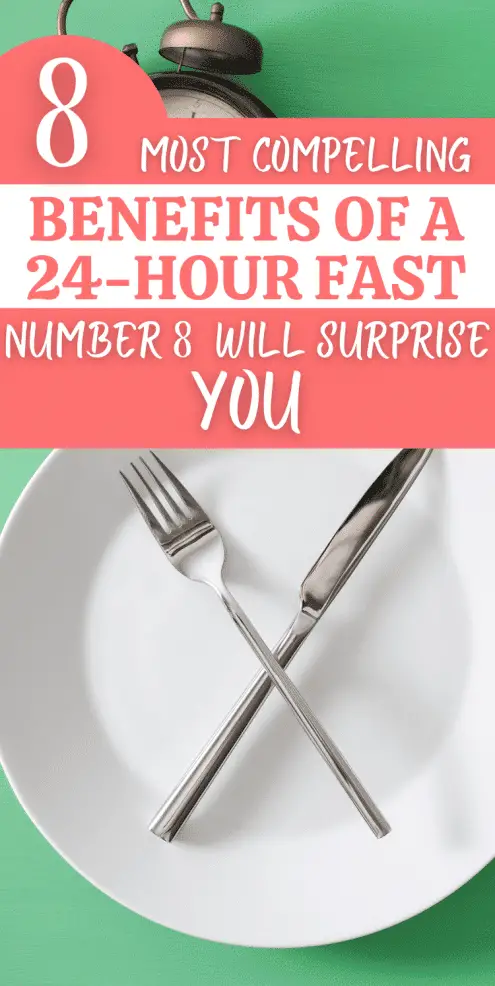The benefits of a 24 hour fast are due to your body running out of glycogen and producing ketones for energy. So, what happens during the next 12-hour period? What are the benefits of a 24 hour fast?
Benefits of a 24-Hour Fast
Many benefits of a 24-hour fast start occurring sooner, like weight loss and improved metabolic health. However, when you fast longer, you experience deeper ketosis and more autophagy. As you will see, one benefit you start experiencing at around 24 hours is intestinal cell renewal.
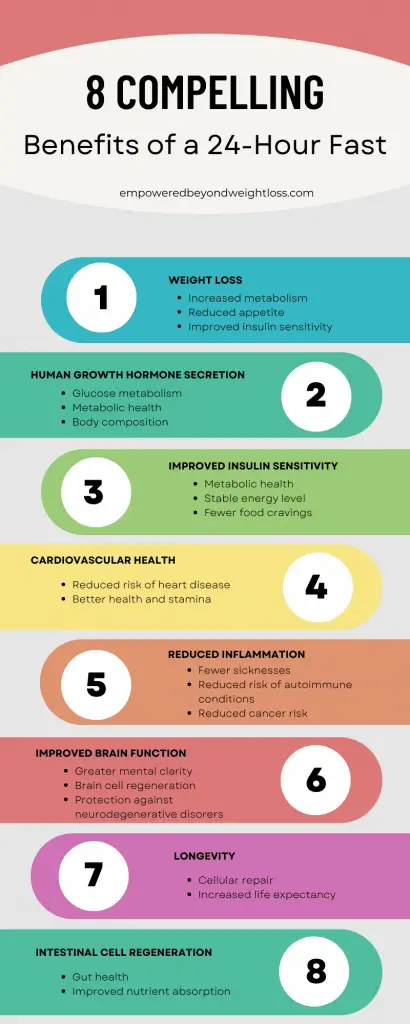
1. Weight Loss
Weight loss is often at the forefront of the mind of those who want to experiment with fasting. It’s no wonder. Fasting will increase your metabolism, regulate your appetite and improve your insulin sensitivity, contributing to weight loss. Fasting too long will slow your metabolism, but intermittent fasting increases weight loss (fasting for up to 36 hours).
In part, people lose weight when intermittent fasting because they eat less. However, weight loss can also be explained by fasting improving insulin sensitivity (we will discuss that in the next point). Insulin is a fat-storing hormone.
How Much Weight Can You Lose With a 24-Hour Fast?
If you were to fast for 24 hours only twice a week, you could lose about 1-2 lbs a week. A calorie deficit of around 3,500 calories is generally required to lose 1 pound weekly. Skipping two full days of food would offer a calorie deficit of 4,000 calories. Plus, as we discussed, it would help you feel satisfied sooner on the days you eat and possibly help your body store less fat. No, weight loss isn’t just about calories: that’s a given. However, calories do matter.
Want to use intermittent fasting as a tool to conquer your food cravings and biohack weight loss? Check out my Weight Loss Transformation Program.

2. Human Growth Hormone Secretion
Human Growth Hormone, or HGH, is a hormone that affects many aspects of your health. It’s involved in glucose metabolism, metabolic health and body composition, as well as muscle strength. Some people call it the fountain of youth because of its anti-aging benefits!
Fasting for 24 hours significantly increases HGH. Fasting two or three days will double or triple your HGH levels. Moreover, HGH rises after exercise and sleep.
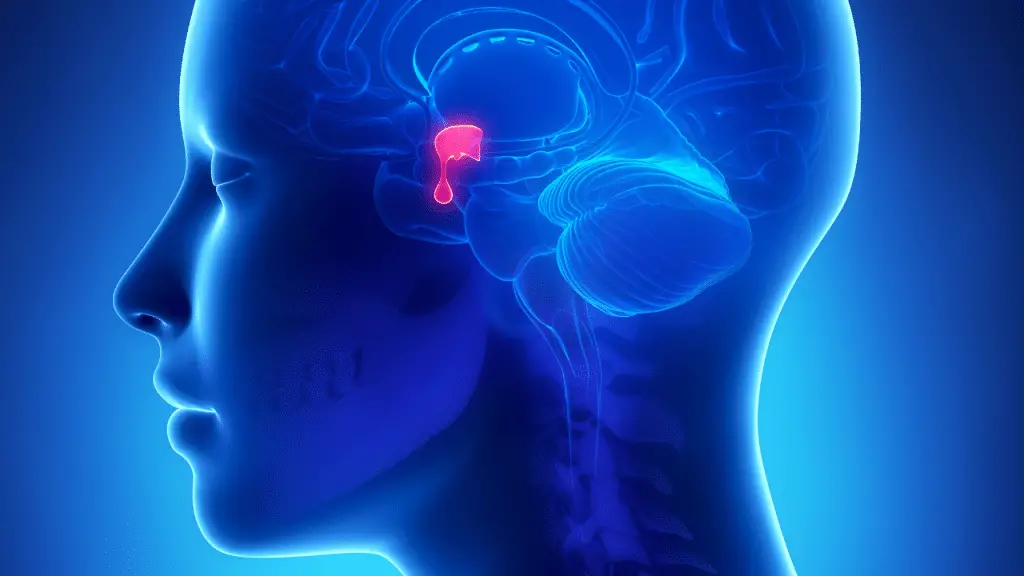
3. Improved Insulin Sensitivity
Improving your insulin sensitivity means your body doesn’t need to produce as much insulin to transport glucose to your cells. Your blood glucose will remain more stable, especially if you are at risk for diabetes.
Intermittent fasting is as effective as calorie restriction in improving insulin sensitivity.
As I mentioned, insulin makes your body store fat, particularly around your middle. Improving insulin sensitivity improves your metabolic health. Besides weight loss and overall health, your energy level may be more stable (bye-bye afternoon crashes!).
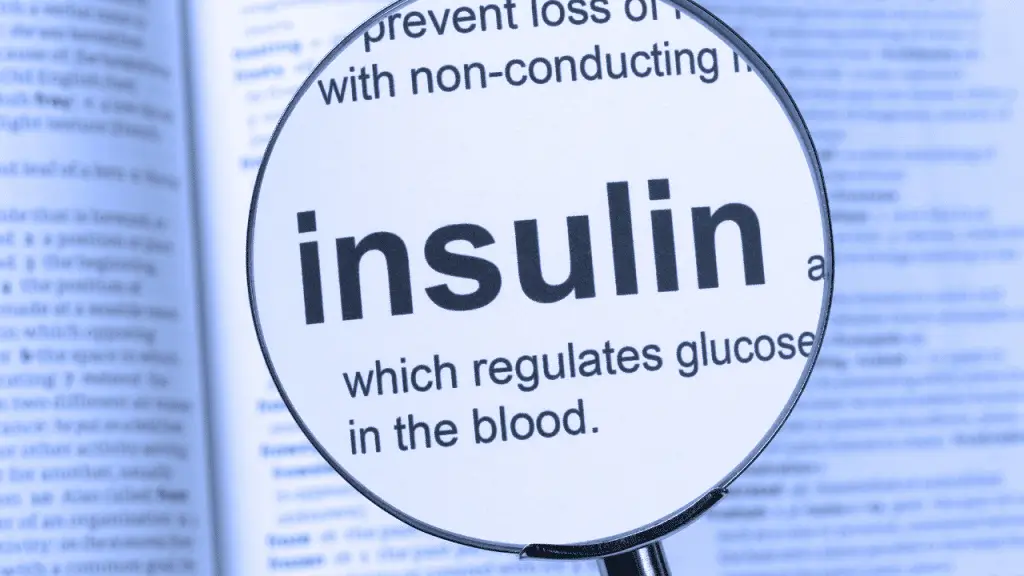
4. Cardiovascular Health
As fatty acids become the main energy source, your lipid profile improves. This will reduce your risk of heart disease and diabetes and improve your energy level and stamina. Consequently, one of the benefits of a 24-hour fast is improving your heart health.
5. Reduced Inflammation
Inflammation has become a pretty trendy word in the natural health world. “Supplements to reduce inflammation,” “anti-inflammatory foods,” and “avoiding inflammatory foods” are phrases that we hear a lot. For good reason! Even though a certain level of inflammation is natural and helpful in fighting common pathogens, chronic inflammation depresses your immune system and makes you feel tired and sick. It may also lead to autoimmune diseases as your body starts attacking itself. Chronic inflammation may even contribute to cancer!
Consuming refined carbs, oils, excessive alcohol, and processed foods all cause chronic inflammation. Moreover, insulin resistance contributes to inflammation. This may partly explain why your inflammation biomarkers will decrease after practicing intermittent fasting for one month.

6. Improved Brain Function
Ketones are often referred to as “brain fuel.” The ketogenic diet was originally devised to help those who suffer from epilepsy. When you fast or your carb intake falls below 50 grams daily, your liver will increase ketone production to fuel your cells. Your metabolism will switch from using glucose to using ketones for energy. Many people notice that they experience greater mental clarity when the metabolic switchover occurs.
Furthermore, fasting protects your brain health by increasing the rate at which your brain cells regenerate. That’s not all! Since everything is interconnected in your body, fasting reduces inflammation and helps protect against neurodegenerative disorders like Parkinson’s and Alzheimer’s. Not only that, but your body will start breaking down proteins linked to neurodegenerative disease when you fast for 24 hours.

7. Longevity
I love to talk about how your body repairs itself when you fast. In my post What Is Autophagy and How to Induce It, I explain how fasting stimulates autophagy and improves longevity. In one study, rats that fasted every other day lived 83% longer than rats that didn’t fast. Of course, these results cannot be transferred to humans exactly, but it still demonstrates the healing power of fasting.
8. Intestinal Cell Regeneration
I mentioned that the benefits of a 24-hour fast are not necessarily exclusive to fasting for 24 hours. However, intestinal cell regeneration starts happening at the 24-hour mark, so that’s one good reason to aim for 24 hours when you fast at least sometimes.
As you age, all the cells in your body don’t regenerate as fast. Intestinal cell renewal is important for ensuring proper nutrient absorption and gut health.
When you fast for 24 hours, you start experiencing significant autophagy. Learn more in my post How Long Should You Fast For Maximum Benefits?
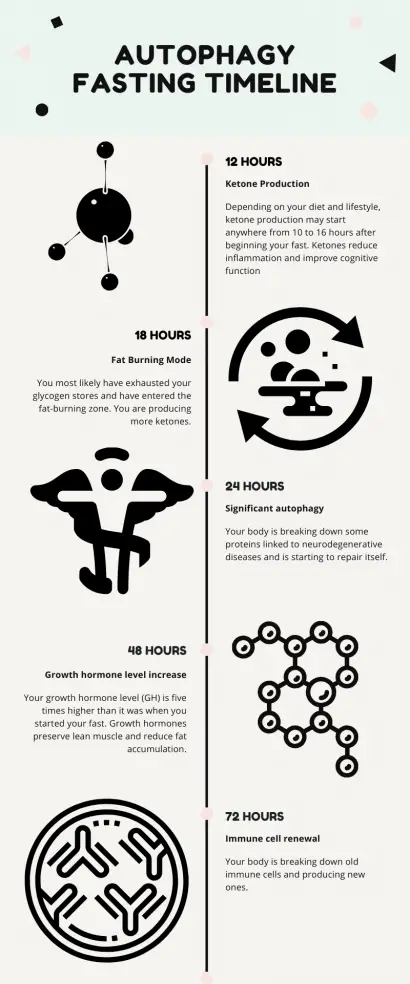
How Often to Do a 24-Hour Fast
Fasting once or twice a week is a good way to reap some benefits of a 24-hour fast.
Start fasting after dinner on, say, Monday night. Eat dinner one hour later on Tuesday night to get your full 24-hour fast. Repeat on Thursday night. Sounds pretty doable.
When I started experimenting with intermittent fasting after doing my first modified fast in Fall of 2019, I started with one 24-hour fast a week. The results I was getting encouraged me to fast more frequently. However, when I started fasting every day, I reduced the length of my fasts to 20 hours. Do what works for you.
Sign up for my workshop, Intermittent Fasting 101, to learn more about practicing intermittent fasting for health and weight loss.
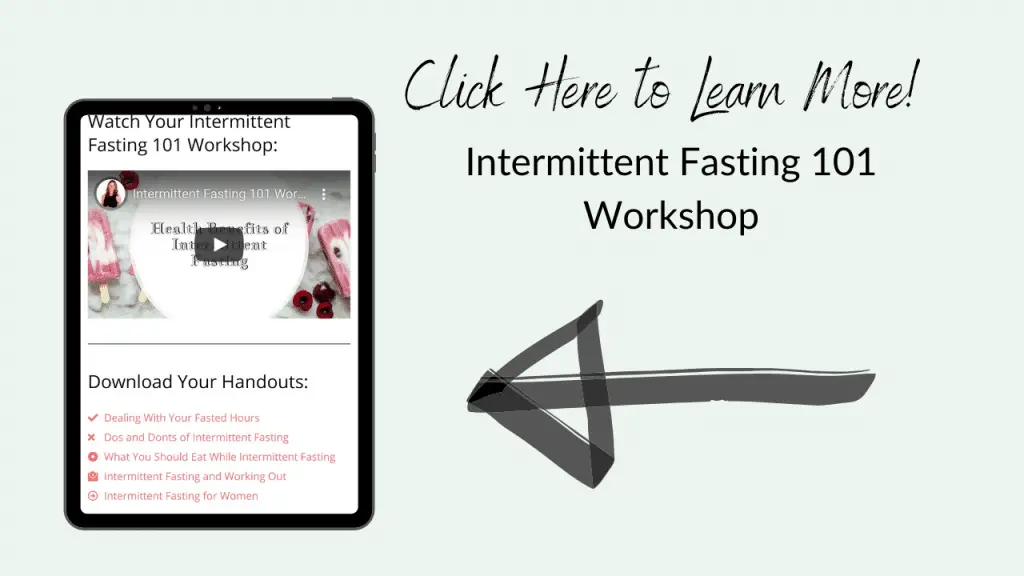
How to Break a 24-Hour Fast
When you fast for less than 24 hours, breaking your fast shouldn’t concern you too much. Eat a good wholesome meal. If you struggle with digesting foods, stay away from those foods. It’s simple (What t.o Eat to Break a Fast (Don’t Sweat the Small Stuff))!
However, here are some tips you may find helpful:
- Ensure you drink plenty of water and a tall glass before breaking your fast. About one ounce of water per pound of body weight is usually recommended.
- Break your fast with nutrient-dense foods. Nutrient density is a way to assess the number of nutrients for the number of calories. Nutrient-dense foods have tons of vitamins and minerals, provide relatively few calories, and are easier to digest. The Power Shake is my favorite food to break a fast.
- Make your first meal light. It’s a good idea to break your 24-hour fast with a lighter meal and eat something heavier later.
- Choose foods that you tolerate well. The foods that you should consume to break a fast are the foods that usually make you feel good.
- Sit down and chew your food well. I am guilty of not always following my advice and breaking my fast as I prepare a salad. For example (I love these pieces of feta cheese and the huge garlic-stuffed olives). However, it is best to sit down and enjoy your food slowly.

In Summary
The benefits of a 24-hour fast are clear. Fasting promotes healing; the longer you fast, the greater the benefits (OK, up to a certain point!). Understanding this may make you wonder if you should attempt a 5-day water fast. Here’s my advice: before jumping into prolonged water fasting, try a few modified fasts (Modified Fasting: How You Can Benefit From Fasting Without Starving). The science behind modified fasting is solid, and you may reap all the benefits you ever want without having to go entirely without food for a prolonged period.
Furthermore, consider reading What to Eat After a 24-Hour Fast to learn how to break your fast.

